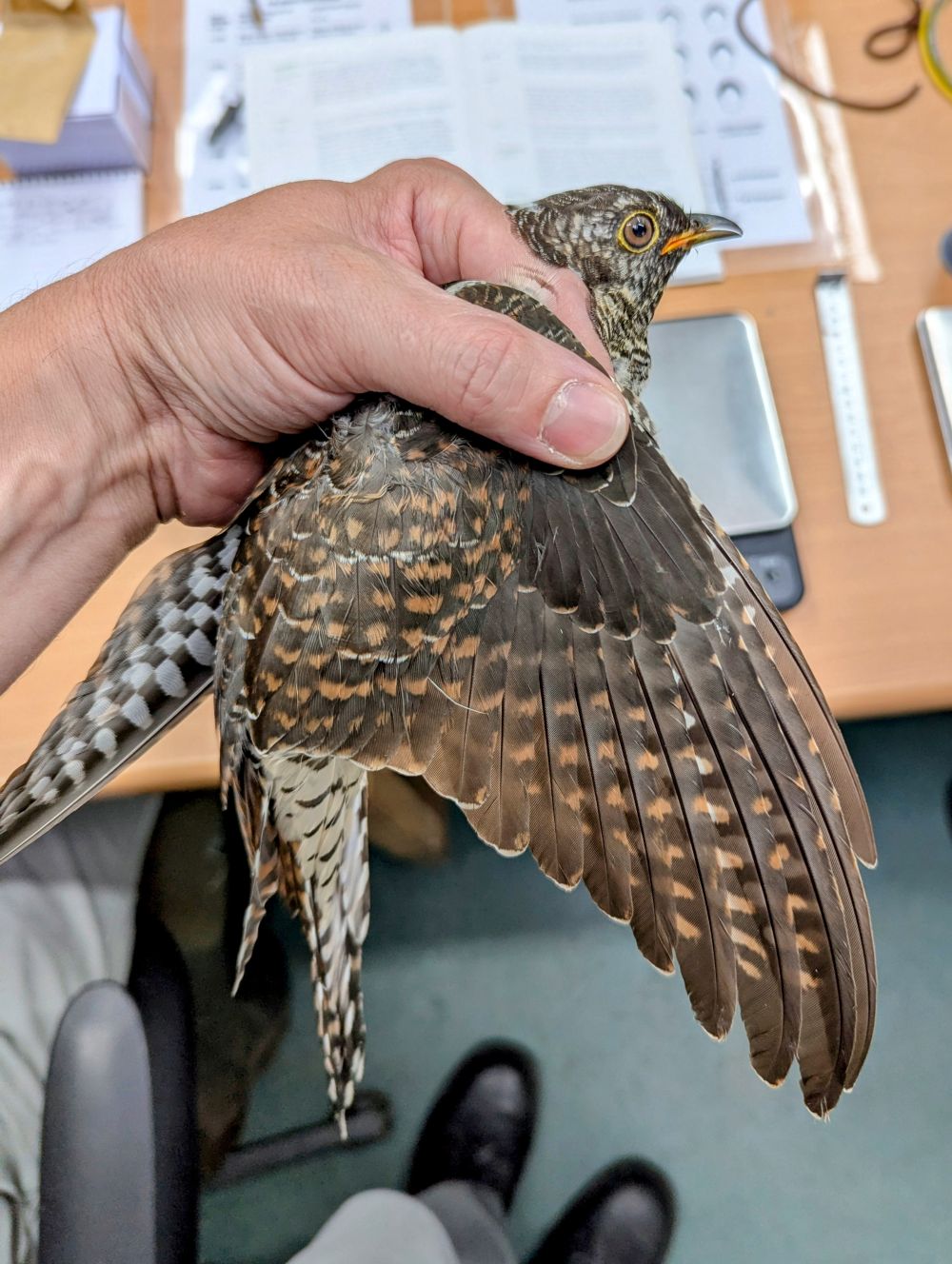Wednesday 30th
It was good to be able to get a team out today and they were rewarded with a successful morning. There were 58 new birds of 14 species. The highlight was a juvenile Cuckoo. Colour was added by a Jay and a Green Woodpecker. Migrants are definitely on the move and, although we still have not caught a Crossbill or a Sand Martin, there was a good mixture of other migrants. They were 14 each of Willow Warbler and Reed Warbler, eight Whitethroats, four Chiffchaffs, three Garden Warblers, two Sedge Warblers and singles of Lesser Whitethroat and Spotted Flycatcher ( the first this year). The remainder were two Blue Tits and single Chaffinch and Great Tit. The only slight concern is the lack of Sedge Warblers, we would normally expect better numbers of these before Reed Warblers.

Sunday 27th
The breeze did get up but it was still fairly good conditions. There were 28 new birds - Blackbird (1), Blackcap (2), Dunnock (1), Great Tit (2), Lesser Whitethroat (1), Reed Warbler (8), Robin (3), Sedge Warbler (2), Song Thrush (1), Swallow (1), Whitethroat (5) and Wren (1).
The Swallow was the first for the autumn and eight Reed Warblers hinted at good productivity.
Friday 25th
After all the dry weather there has been some much welcome rain but this has meant some sessions had to be cancelled. Our team is also struggling with a rash (literally in one case) of illness in the senior ringers. It was good to get a team out today in good conditions. Autumn migration has started and they were rewarded with 38 new birds. Three Willow Warblers were the first of the autumn. Other warblers on their way out were eight Whitethroats, seven Chiffchaffs, five Reed Warblers, three Blackcaps and a Lesser Whitethroat.
Thursday 17th
A quiet session with a few nets this morning yielded 15 birds of which nine were new. It was the usual mixture of young birds - three Whitethroats, two Chiffchaffs and singles of Blackbird, Great Tit, Lesser Whitethroat and Robin.
A check of the boxes on Sandown Road provided mixed results. The House Sparrows are continuing to produce small numbers of young. Most of the earlier House Martins had fledged but one nest, with chicks very near fledging, had failed. Whether this was due to one of the rapid turns in weather or adult(s) being predated we will not know.
Sunday 13th
The heat continues and this time it seems to have affected the birds. Just seven new birds were caught and five of these were resident rather than migrant species - two Wrens and single Robin, Blackbird and Great-spotted Woodpecker. Two Blackcaps were the migrants.
Friday 11th
The encroaching heat meant an early finish. This was not before 16 more juveniles were ringed. The best was a Cetti's Warbler. The second Reed Warbler of the autumn plus four more Chiffchaffs were of note.
Wednesday 9th
After the extreme rarity on Sunday- it was raining before first light- normal service was resumed with a clear and warm start. The heat wave is on its way.
It was also a rewarding morning with 23 new birds. A very immature Redstart and Garden Warbler were probably early wanderers. Seven more young Blackcaps and four each of Chiffchaff and Whitethroat added to the juvenile-fest.
Not to be out done there was a control Lesser Whitethroat.
Friday 4th
A calmish start before the regular stiff breeze got up mid-morning. It remains hot.
There were 20 new birds this morning. This included the first Reed Warbler of the autumn and some young Blackcaps of the second brood. Chiffchaffs were most frequent with six ringed.
Last evening another 14 House Martin pulli were ringed. A couple of nests held second brood eggs and so they are trying to make up for a slow start.
Wednesday 2nd
A bit of a delay due to illness. The ringers have continued however and the steady trickle of young birds continues. The best bird today however was an adult, namely the first Willow Warbler of the autumn. This species is now an very scarce breeder in East Kent and this will probably have been a failed breeder getting ready to moult.
A young Green Woodpecker was the first unringed one of these this year.
